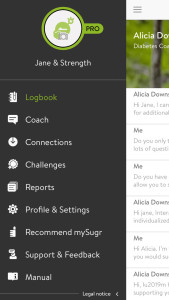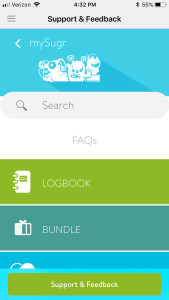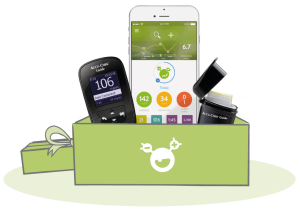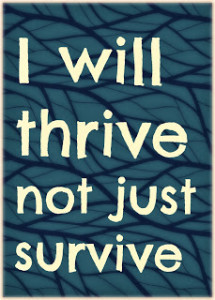This post, mySugr and me, was sponsored by mySugr. 
I tried something new over the past few weeks! Yay me, because I tend to get stuck in my diabetes ruts. This time I tried an app for glucose monitoring. The app is called mySugr, it comes with unlimited strips and access to a diabetes educator/coach. Pretty intriguing!
My thoughts/feedback:
The meter (Accu Chek Guide) was easy to set up, easy to use, and all the things you’d expect. As someone who is aging (oh yea, we are all aging), I did not like the teeny-tiny strips. While I did not have too much trouble with them, I think an older person or someone with dexterity challenges could. The bottle they come in, however, is pretty cool, and the way they suck the blood in sideways is cool too. I found myself tagging my BG (blood glucose) results, and was bummed there was no “before/after exercise” option. I think this would be especially helpful for working with the diabetes educator.
I reached out to my “coach” (diabetes educator) and found her responsive, friendly, and willing to be helpful (I didn’t have specific questions). I did learn that the coach is only available through the app and speaking by phone is not an option. Being a live interaction person (who teaches online, ha!!), I would have liked that option. On the other hand, I’m sure one can accomplish a lot through typing as well – we certainly do in class!
 This digital health app loaded nicely on my iPhone and is very easy to navigate, makes sense, etc. At first the little monster scared me when he/she/it made that noise each time data/numbers came through. After a while I got used to it though, and I admit it is cute and quirky. I named mine “Strength.”
This digital health app loaded nicely on my iPhone and is very easy to navigate, makes sense, etc. At first the little monster scared me when he/she/it made that noise each time data/numbers came through. After a while I got used to it though, and I admit it is cute and quirky. I named mine “Strength.”
My challenge was with transferring data. Three times the meter stopped transferring my numbers over to the app. The first time I was able to force a transfer of data and then it started sending automatically again. The second and third times it stopped working and didn’t start up again, so I had an opportunity to check out the FAQ and support!
Right now the support response is a little slower than I would like, and it’s hard to get a human on the phone. While I realize this works for many (most?) people; I still like to talk to someone when I’m having trouble getting something to work.
When I did speak with the support person at mySugr, she was able to help me trouble shoot – and fix! – the problem. She was not able to tell me why I was having this strange problem and suggested a workaround of sorts for when/if it keeps happening. She apologized for the inability to call and speak to a human and for the delay in hearing back from support. She assured me that mySugr is working on a quicker turnaround. She was very friendly, helpful, and willing to listen to my feedback. She told me she would pass it along to the company.
I got the feeling this app is geared toward a younger crowd. However, I think it would be a great app for a broader audience than that, which is why having support available around the clock and throughout the week would be helpful. They do have short video tutorials (some people learn better by seeing/hearing than by reading instructions) within the FAQ, which is very helpful. Having the ability to talk to someone is really only necessary if we can’t find what we need in the FAQ.
 Takeaways:
Takeaways:
- Very convenient to have strips delivered to your door in unlimited quantities
- Amazing to have access to a diabetes educator/coach for questions, bouncing ideas off, etc.
- Cute monster – clearly a fun, friendly company (that is open to feedback and improvement)
- Motto: “make diabetes suck less”
- Nice, knowledgable support person
- Easy to use meter and app
- Cool to have an estimated A1C
- Having blood glucose readings logged and immediately available is wonderful for people to engage in their results and care. This might be the best thing about it, because otherwise we wait until provider visits to see those trends.
 The really fun part:
The really fun part:
mySugr and I are giving away two 6-month mySugr bundle subscriptions! Here’s what you have to do for a chance to win: leave a comment below and tell us what you will name your diabetes monster. Drawing is open until August 20th. Fine print: This giveaway is open to US residents only. Existing mySugr bundle subscribers and those insured by government programs (Medicare/Medicaid) are not eligible to participate.


 This digital health app loaded nicely on my iPhone and is very easy to navigate, makes sense, etc. At first the little monster scared me when he/she/it made that noise each time data/numbers came through. After a while I got used to it though, and I admit it is cute and quirky. I named mine “Strength.”
This digital health app loaded nicely on my iPhone and is very easy to navigate, makes sense, etc. At first the little monster scared me when he/she/it made that noise each time data/numbers came through. After a while I got used to it though, and I admit it is cute and quirky. I named mine “Strength.” Takeaways:
Takeaways:




